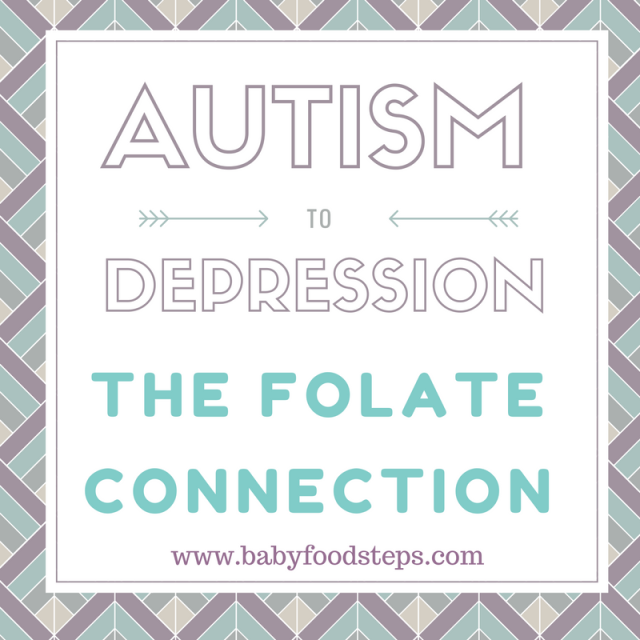
In the past few years our family has learned volumes of information about various biological processes in the body. One of those metabolic cycles has been the FOLATE cycle or in lay-man’s terms: how folate (and the folic acid we ingest in fortified foods) is converted into an active and useable chemical, folate, by the body and particularly the brain.
New research out of Arkansas Children’s Hospital this week shows that this nutrient (a B vitamin) is important to Autism and research out of Pittsburgh about a month ago shows this nutrient is ALSO crucial for depression (especially in teens).
Research from Arkansas Children’s Hospital: HERE
Research from Western Psych and Pittsburgh Children’s Hospital: HERE
Now for a little run down on what these studies highlight-
FIRST AND FOREMOST both studies show that a condition that is defined as a mental illness by classification in the DSM-V (autism and depression), has biological and metabolic roots that when addressed can be successfully treated with significant improvements in the individual with the condition.
Both studies also use a form of the vitamin B-9 (folinic acid) which is biologically active and in a reduced form versus the oxidized (and less active) form found in many over the counter vitamin supplements and in fortified food (folic acid). Note the extra “in” in the FOLINIC form of the vitamin versus the FOLIC form of the vitamin, it may just be a 2 letter difference but it has a BIG impact on what this chemical does in the body.
The study from Arkansas looked at a group of 48 children with Autism Spectrum Disorder were randomized into 2 groups, one receiving high dose FOLINIC acid and the other receiving a placebo. Those who received the FOLINIC acid had improvements in verbal communication (as measured by a standardized instrument) which was categorized as a medium to large effect. Those who had the most significant improvements were found to be a sub-category of participants who had positive folate receptor alpha autoantibodies (FRAA) and lower glutathione redox ratio (GSH/GSSG), suggesting that those with more abnormal folate metabolism biomarkers were better responders to high dose FOLINIC acid treatment. You can read more about FRAA testing here.
The study from Pittsburgh showed a group of 33 patients with treatment-refractory depression (did not respond to multiple medications), upon Lumbar puncture (spinal tap) it was found that 21 (64%) of the participants had metabolic abnormalities in their cerebral spinal fluid (CSF) while NONE of the health comparison participants showed any metabolite abnormalities. Of those abnormalities, Cerebral FOLATE deficiency (abnormal analyze in CSF= 5-methyltetrahydrofolate (5-MTHF) was found in the largest group of patients (12 of them, or 36% of the study group). Upon treatment with FOLINIC acid in the 12 patients with CFD, 10 of them had improvements in both depression and suicide scores (of the other 2, one was non-adherent and one was lost to follow-up). It is intersting to note that 8 of the patients with CFD underwent genetic testing for MTHFR polymorphisms which were negative in all of them.
Both studies are incredibly exciting and ground breaking because they BOTH suggest that a mental diagnosis may be successfully treated with a specialized form of a VITAMIN. This gives HOPE to many families whose children and young adults are impacted by these conditions.
More research must be done to confirm these results and to also determine who is the best candidates for successful treatment, but I am thankful to both these researchers for the work they have done in this field to find root causes for conditions that are impacting families across this nation.
In full disclosures, Folinic acid treatment is something we have tried in the past on our journey. We did not see as positive of an outcome as these studies suggest, however; this negative response to folinic acid and also to other forms of active folate (L-methyl folate) have led us to other hypothesis as to why our daughter did not respond positively to active folates. If there are others out there whose child has had this experience, please contact us! We would love to compare notes. One theory we, along with a few researchers have, is that abnormal methionine metabolism and methionine deficiency may lead to an adverse response to active folate (including folinic acid). As we continue to search for answers, we are thankful for these researchers blazing the trail into this field of metabolic science.

